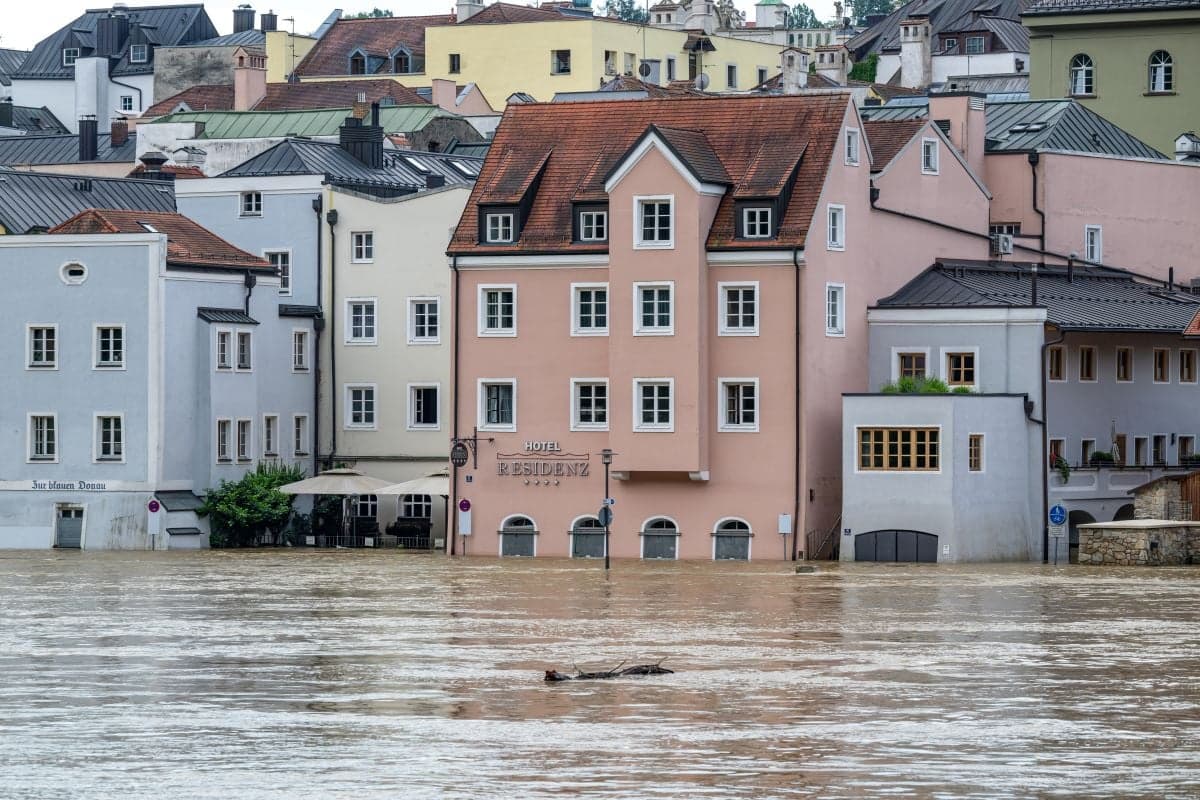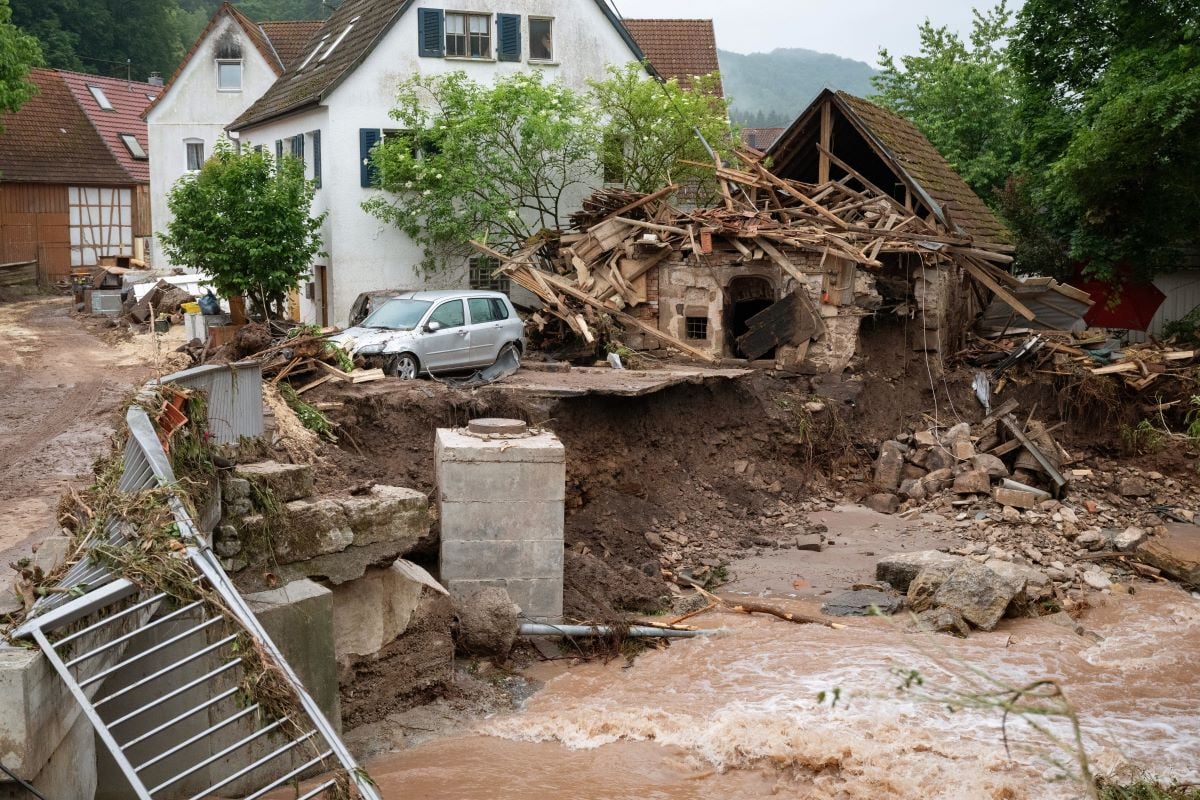How changes to flood insurance could push up rates for homeowners in Germany

Homeowners' lack of natural disaster insurance costs Germany billions every time a major flooding event occurs. Policy makers are debating whether insurance companies should be required to offer coverage.
Two weeks after deadly floods in southern Germany caused billions of euros in damage, state premiers from the 16 states and Chancellor Olaf Scholz (SPD) are discussing compulsory insurance against flooding on Thursday.
The federal government is proposing a reverse insurance obligation - not for homeowners, but for insurers - which would require insurance companies to offer flood protection to every homeowner who wants to insure themselves against natural hazards.
Currently owners of homes in high risk flooding areas are often unable to find an insurance company that is willing to cover the risk.
This move could have a domino effect that would push up the cost of insurance for all homeowners in Germany.
Why is compulsory insurance being discussed?
Germany’s flood policies are being re-evaluated following the fatal, and extremely costly, flooding events that swept southern regions of the country at the beginning of June.
Estimated insured losses for southern Germany are expected to “fall within the range of €2 billion to €3 billion”, according to Moody's RMS.
A significant portion of those losses are from damage to homes. Some affected homeowners have opted-out of flood protection in their insurance plans, and others may not have been able to secure affordable flood insurance in the area where they live.
General homeowner’s insurance (Wohngebäudeversicherung) or household contents insurance (Hausratversicherung) doesn’t cover flood damages. Natural disasters, like flooding, are often only covered by supplementary “extreme weather protection” (Extremwetterschutz).
Only about half of German homes are insured against natural disasters.
READ ALSO: Where in Germany do homeowners face the greatest flood risk?
Looking at the devastating floods in July 2021, for example, insured losses amounted to almost €9 billion, but total damages including the uninsured losses to citizens, reached the astronomical sum of €33 billion, according to calculations by the reinsurer Munich Re.
When uninsured losses are that extensive, federal and state governments are forced to step in as an unofficial insurer, paying billions in aid. This is extremely expensive for the states, which have called for compulsory insurance against flooding.

View of a building on the Wieslauf destroyed by flooding. Photo: picture alliance/dpa | Marijan Murat
How would homeowners be affected?
Compulsory insurance would likely push up insurance rates for homeowners across Germany, because ultimately insurers would look to offset the added risk.
Even private homeowners whose houses are far away from any body of water would end up contributing to the costs somewhat.
Owners of apartment buildings would presumably want to pass this on to their tenants - including, for example, those on upper floors in units that face little to no risk of flood damages.
READ ALSO: EXPLAINED - What fees do you have to pay when buying a home in Germany?
What are the arguments for and against the plan?
The argument for compulsory insurance essentially stems from the idea that homeowners in flood-prone regions deserve protection. Without help, uninsured homeowners in flood prone regions are threatened with financial ruin.
The counter-argument suggests that the general public should not be expected to front the costs for uninsured homeowners’ personal risk.
Some argue that municipalities that have allowed for homes to be built in known high-risk zones should bear those costs.
A survey by the Verivox portal, found that 71 percent of private homeowners support a concept for compulsory insurance against natural hazards.
However, insurers, homeowners' associations and some politicians including Justice Minister Marco Buschmann (FDP) are primarily against the compulsory insurance plan.
Explaining Allianz’s position, board member Klaus Peter Roehler, wrote a statement that the company thinks customers should retain the right to opt-out of natural disaster protection.
He suggests that as extreme weather events become more likely, a solid response plan needs to be based on three core concepts. “Prevention and protective measures to adapt to the effects of climate change, insurance coverage calculated on a risk-adjusted basis, and state support in the event of extreme disasters," said Roehler.
His last point gets at the heart of the whole conflict around compulsory insurance - insurers don’t want to be left to solely cover the cost of natural disasters, and neither do the state or federal governments.
Insurers are also calling for better prevention against flooding, which could include building bans in flood zones, for example. But such measures are unpopular in local communities.
Two weeks ago, Bavaria's state premier Markus Söder (CSU) called for compulsory insurance for homeowners on the one hand and at the same time rejected building bans in flood-prone areas. A move that demonstrates his effort to appeal constituents' concerns, but reveals a complete lack of planning to mitigate future damages.
Comments
See Also
Two weeks after deadly floods in southern Germany caused billions of euros in damage, state premiers from the 16 states and Chancellor Olaf Scholz (SPD) are discussing compulsory insurance against flooding on Thursday.
The federal government is proposing a reverse insurance obligation - not for homeowners, but for insurers - which would require insurance companies to offer flood protection to every homeowner who wants to insure themselves against natural hazards.
Currently owners of homes in high risk flooding areas are often unable to find an insurance company that is willing to cover the risk.
This move could have a domino effect that would push up the cost of insurance for all homeowners in Germany.
Why is compulsory insurance being discussed?
Germany’s flood policies are being re-evaluated following the fatal, and extremely costly, flooding events that swept southern regions of the country at the beginning of June.
Estimated insured losses for southern Germany are expected to “fall within the range of €2 billion to €3 billion”, according to Moody's RMS.
A significant portion of those losses are from damage to homes. Some affected homeowners have opted-out of flood protection in their insurance plans, and others may not have been able to secure affordable flood insurance in the area where they live.
General homeowner’s insurance (Wohngebäudeversicherung) or household contents insurance (Hausratversicherung) doesn’t cover flood damages. Natural disasters, like flooding, are often only covered by supplementary “extreme weather protection” (Extremwetterschutz).
Only about half of German homes are insured against natural disasters.
READ ALSO: Where in Germany do homeowners face the greatest flood risk?
Looking at the devastating floods in July 2021, for example, insured losses amounted to almost €9 billion, but total damages including the uninsured losses to citizens, reached the astronomical sum of €33 billion, according to calculations by the reinsurer Munich Re.
When uninsured losses are that extensive, federal and state governments are forced to step in as an unofficial insurer, paying billions in aid. This is extremely expensive for the states, which have called for compulsory insurance against flooding.

How would homeowners be affected?
Compulsory insurance would likely push up insurance rates for homeowners across Germany, because ultimately insurers would look to offset the added risk.
Even private homeowners whose houses are far away from any body of water would end up contributing to the costs somewhat.
Owners of apartment buildings would presumably want to pass this on to their tenants - including, for example, those on upper floors in units that face little to no risk of flood damages.
READ ALSO: EXPLAINED - What fees do you have to pay when buying a home in Germany?
What are the arguments for and against the plan?
The argument for compulsory insurance essentially stems from the idea that homeowners in flood-prone regions deserve protection. Without help, uninsured homeowners in flood prone regions are threatened with financial ruin.
The counter-argument suggests that the general public should not be expected to front the costs for uninsured homeowners’ personal risk.
Some argue that municipalities that have allowed for homes to be built in known high-risk zones should bear those costs.
A survey by the Verivox portal, found that 71 percent of private homeowners support a concept for compulsory insurance against natural hazards.
However, insurers, homeowners' associations and some politicians including Justice Minister Marco Buschmann (FDP) are primarily against the compulsory insurance plan.
Explaining Allianz’s position, board member Klaus Peter Roehler, wrote a statement that the company thinks customers should retain the right to opt-out of natural disaster protection.
He suggests that as extreme weather events become more likely, a solid response plan needs to be based on three core concepts. “Prevention and protective measures to adapt to the effects of climate change, insurance coverage calculated on a risk-adjusted basis, and state support in the event of extreme disasters," said Roehler.
His last point gets at the heart of the whole conflict around compulsory insurance - insurers don’t want to be left to solely cover the cost of natural disasters, and neither do the state or federal governments.
Insurers are also calling for better prevention against flooding, which could include building bans in flood zones, for example. But such measures are unpopular in local communities.
Two weeks ago, Bavaria's state premier Markus Söder (CSU) called for compulsory insurance for homeowners on the one hand and at the same time rejected building bans in flood-prone areas. A move that demonstrates his effort to appeal constituents' concerns, but reveals a complete lack of planning to mitigate future damages.
Join the conversation in our comments section below. Share your own views and experience and if you have a question or suggestion for our journalists then email us at [email protected].
Please keep comments civil, constructive and on topic – and make sure to read our terms of use before getting involved.
Please log in here to leave a comment.